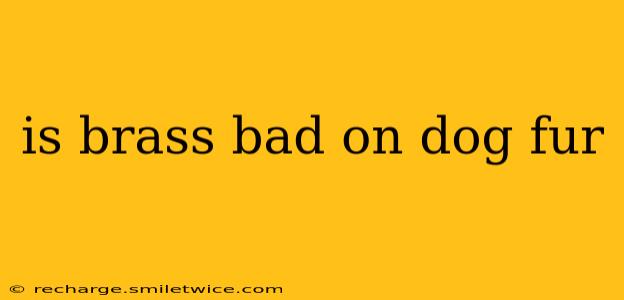Is Brass Bad for Dog Fur? A Comprehensive Guide
Brass, a beautiful and durable alloy of copper and zinc, finds its way into many household items, from decorative accents to dog collars and leashes. But is brass bad for your dog's fur? The answer isn't a simple yes or no. The potential impact depends on several factors, including the quality of the brass, the dog's sensitivity, and the duration of contact.
This guide will explore the potential risks and benefits of brass interacting with your canine companion's coat, answering common questions dog owners have about this material.
Can Brass Cause Allergies in Dogs?
This is a key concern for many pet owners. While brass itself is not typically a major allergen, some dogs can develop contact dermatitis from exposure to brass. This allergic reaction usually isn't directly caused by the brass itself, but by other components in the item made of brass, such as nickel or other metals sometimes used in plating or other manufacturing processes. Nickel, in particular, is a common allergen in dogs. If your dog shows signs of irritation like redness, itching, or hair loss near areas of contact with a brass item, consult your veterinarian immediately. They can determine the cause of the reaction and suggest appropriate treatment.
Is Tarnished Brass Harmful to Dogs?
Tarnished brass loses its shine and develops a dull, sometimes dark patina over time due to oxidation. While this tarnish is generally not toxic, it shouldn't be ingested. If your dog chews on a brass item significantly enough to ingest pieces of tarnished brass, contact your vet. However, the tarnish itself is not inherently poisonous.
What Happens if My Dog Licks Brass?
Occasional licking of brass items is unlikely to cause harm. However, excessive licking or chewing could lead to ingestion of small particles. While brass is not typically considered toxic in small amounts, it's crucial to monitor your dog for any signs of gastrointestinal upset such as vomiting or diarrhea. Regular contact with brass through licking could also potentially contribute to any existing allergic reactions, making it essential to monitor your dog's skin.
Are Brass Collars and Leashes Safe for Dogs?
Many well-made brass collars and leashes are perfectly safe for dogs. However, it's critical to choose high-quality items that are made from solid brass and avoid those with nickel plating or other potentially allergenic components. Look for items specifically designed for pet use and free of harmful chemicals or coatings. Regularly inspect your dog's collar and leash for any signs of damage or wear and tear and replace them as needed.
How Can I Minimize the Risk of Brass Affecting My Dog's Fur?
- Choose high-quality brass items: Look for items made of solid brass, free of nickel or other potential allergens.
- Regularly inspect items: Check for damage or wear that could expose your dog to sharp edges or smaller metal particles.
- Monitor your dog's skin: Watch for any signs of irritation, redness, or itching near areas of contact with brass items.
- Consult your veterinarian: If you notice any adverse reactions, contact your vet immediately.
In conclusion, while brass itself isn't inherently harmful to dogs, potential issues arise from individual sensitivities or the presence of other metals in the alloy or its coatings. Responsible selection of brass items, regular monitoring of your dog's skin and behavior, and prompt veterinary attention when needed will ensure the safety of your furry friend. Always prioritize your dog's health and well-being when choosing accessories and household items.
